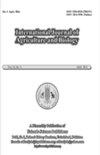{"title":"Depletion and Distribution Studies for Oxytetracycline in Broiler Chicken using Commercial ELISA with Subsequent Confirmatory Analysis by HPLC-UV","authors":"Mehwish Mumtaz","doi":"10.17957/ijab/15.1890","DOIUrl":null,"url":null,"abstract":"Tetracyclines are commonly used in livestock for the treatment of various diseases. Their residues above the maximum residual limit-MRL (200 μg kg-1) can cause health hazard issues not only in humans but also in animals. For this purpose, efforts were made to study distribution and depletion profile of Oxytetracycline in broiler chicken by ELISA and HPLC. Regarding this, an experiment was conducted on healthy chickens of average weight 600 ± 20 g. Six broiler chickens were treated with formulation (OXTRA L.A.) containing Oxytetracycline dehydrate @20 ppk solution (150 μL) equivalents to recommended dose 20 mg kg-1 through intramuscular route, while control birds were untreated. Treated chickens were slaughtered at an interval of 1, 8, 16, 32, 64 and 120 h. Different tissue samples including liver, kidney, thigh and chest muscles were collected and screened by ELISA (Cat No. 5091TC, Euro Proxima). Lowest detection limit (IC20) was calculated as 0.12 ng mL-1 and middle of the test (IC50) 0.5 ng mL-1 with recovery 75 to 86%. Reverse phase liquid chromatography (HPLC-UV) method was also standardized by using range of standards from 25 to 200 μg kg-1. Calibration curve showed good response with correlation coefficient (R2) 0.9727 and recovery 85 to 93%. Overall, withdrawal period (< MRL) in all tissue samples was calculated as 117 h (4.8 days) by ELISA while 128 h (5 days) by HPLC-UV. Both validated methods can be further utilized to generate reliable data for food safety measures in Pakistan to enhance international trade. © 2021 Friends Science Publishers","PeriodicalId":13769,"journal":{"name":"International Journal of Agriculture and Biology","volume":" ","pages":""},"PeriodicalIF":0.0000,"publicationDate":"2021-12-01","publicationTypes":"Journal Article","fieldsOfStudy":null,"isOpenAccess":false,"openAccessPdf":"","citationCount":"0","resultStr":null,"platform":"Semanticscholar","paperid":null,"PeriodicalName":"International Journal of Agriculture and Biology","FirstCategoryId":"1085","ListUrlMain":"https://doi.org/10.17957/ijab/15.1890","RegionNum":0,"RegionCategory":null,"ArticlePicture":[],"TitleCN":null,"AbstractTextCN":null,"PMCID":null,"EPubDate":"","PubModel":"","JCR":"Q2","JCRName":"Agricultural and Biological Sciences","Score":null,"Total":0}
引用次数: 0


